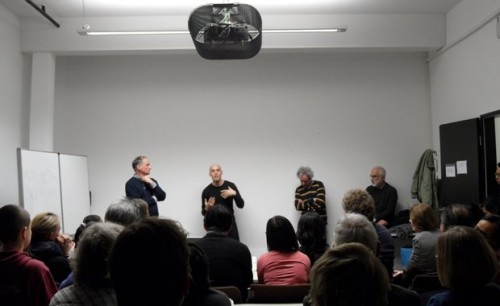The Berlinale Blog: Watching ‘The Act of Killing’ with Indonesians
exberliner.com, 12 February 2013
by Ben Knight
„This is the biggest group of Indonesians I’ve shown the film to since I left Indonesia,“ said Joshua Oppenheimer on Monday night, at an especially cramped and uncomfortable screening of The Act of Killing in a seminar room of the Asian and African Studies department of the Humboldt University. The students were sitting cross-legged on the floor or craning their necks in from the corridor to see the small image projected from an overhead. This screening – a 30-minute extended director’s cut – was organized by the NGO Watch Indonesia! as a special event on top of the regulation five showings in the Panorama section.
Alex Flor of Watch Indonesia! was at an early screening in Jakarta. „It was a lot like this: people in a small room in a locked office,“ he told me. „There have been documentaries before about the purges, but the approach he took was unique.“
In „The Act of Killing,“ gangsters and death squad leaders behind Indonesia’s anti-communist purges of 1965-66 proudly re-enact the executions they carried out, and as the film unfolds, end up somehow tricking themselves into facing their crimes. But it would take Joseph Conrad to describe what happens after that. As Oppenheimer says, it’s a film „less about history than about the Indonesia of today“, where paramilitary organizations hold proto-fascist rallies that celebrate the gangster as a „free man“ and where TV chat shows justify and joke about genocide.
The killers rationalized their crimes by seeing themselves as „killing communists on behalf of the civilizing influence of American culture,“ says Oppenheimer. That, it turns out, was crucial for the making of the film, since the director was granted a unique trust by his subjects, apparently as a result of a misunderstanding: „They thought because I’m an American filmmaker, I must be making an American film.“
Even though Oppenheimer doesn’t think that the influence of movie violence somehow made the killings more brutal than they would have been anyway, a lot of the power of the film comes from the grotesqueness of seeing murderers enjoy dressing up as tacky movie gangsters. Plus, „They imbibed the heroic connotations of words like ‘kill’ and ‘terminate’,“ he adds, before making his own link to the US: „It was strange making this film while my own country was celebrating torture.“
Though Joshua loves and misses Indonesia, the Indonesians in the room were sure of one thing, which they expressed when one young German asked: „Can you go back?“
„I don’t know. What do you guys think? Show of hands. Who thinks I’ll be able to go back safely?“
No one raises their hand.
„Fuck? That bad, huh?“ says Joshua. Everyone laughs.
„There’s no way he can go back,“ the Indonesian student J. told me after the screening. „He tricked them into taking the mask off.“
But that can only be partially true, since one of the former executioners in the film, Anwar Congo – who has been made an „overnight celebrity“ in Indonesia by the film – „stands behind it“ Oppenheimer tells us. „He thinks it’s a beautiful film. We’re in still contact.“ That is just one of several paradoxes the film offers.
Congo’s celebrity status was achieved in spite of the fact that The Act of Killing has not been, and maybe will never be, shown in Indonesian cinemas. And yet, according to Flor, everyone in Indonesia knows about the film, and it has been shown unofficially over 200 times in around 90 Indonesian cities.
„But it’s only one pixel in the whole picture,“ says J. „It’s one story. And we as Indonesians cannot make a film like this. Not even if we live abroad.“








